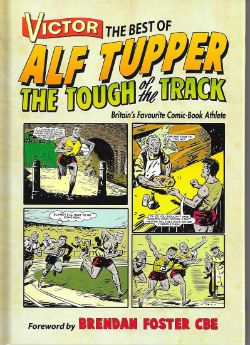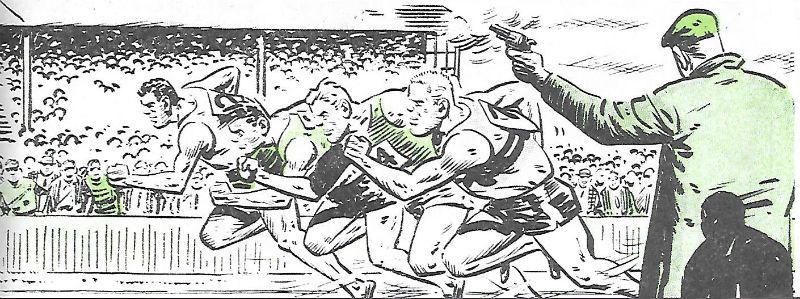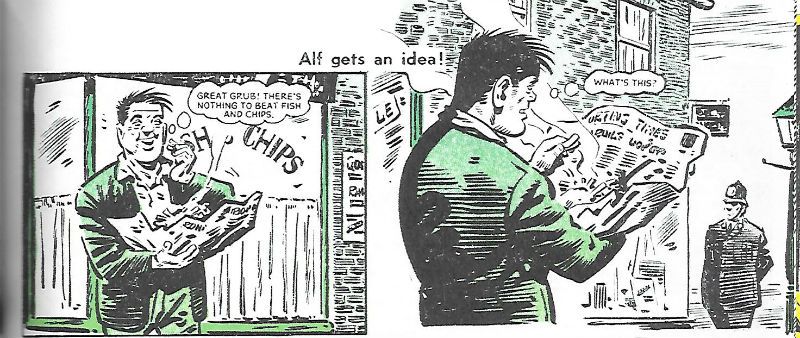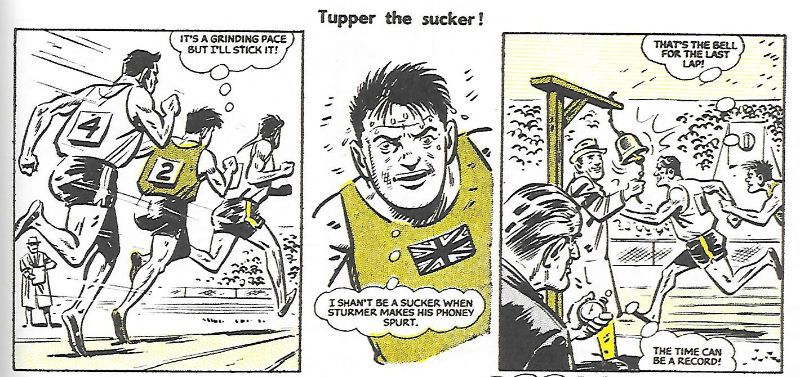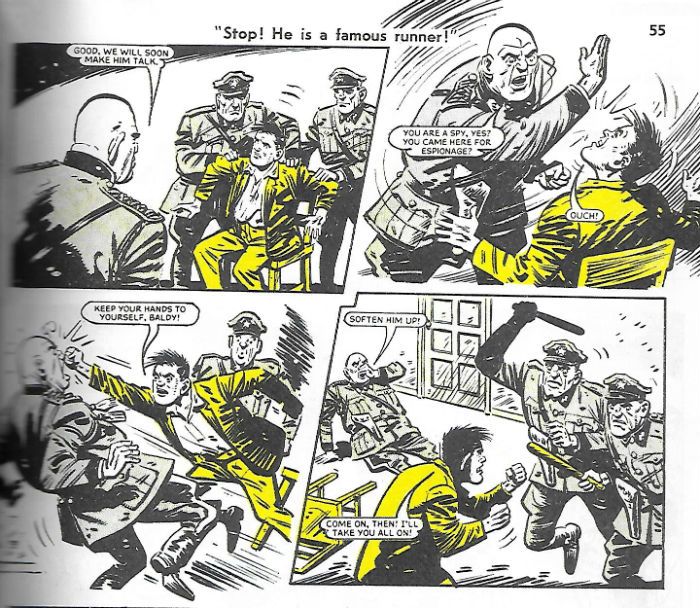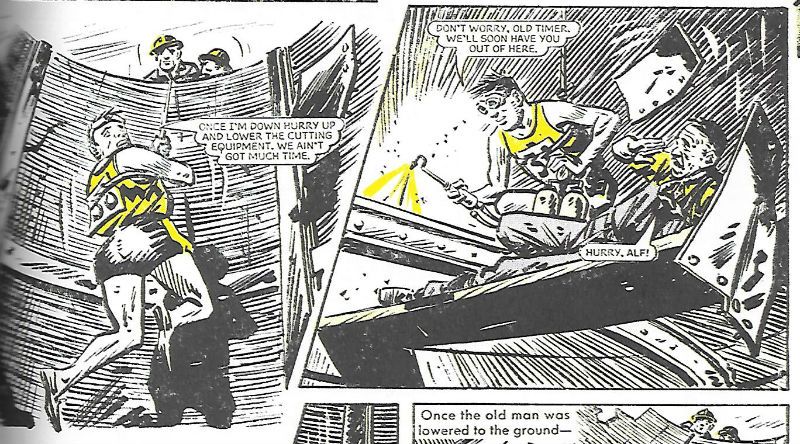“I Ran ‘em!” COMICS! Sometimes Even The Flash looks Like An Aimless Dawdler In Comparison!
/The comics I’m on about this week were not only originally published before you were born they were originally published before I was born; well, just. Tasty! They feature a man who can run really fast but instead of fighting crime and talking killer gorillas he instead wins races in bleak Northern towns purely for his own satisfaction. Somewhere in that comparison I think there lurks the crux of the difference between the American and English characters. Best not to dwell on it, eh?
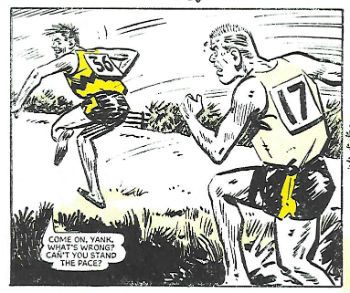
Anyway, this… VICTOR: THE BEST OF ALF TUPPER THE TOUGH OF THE TRACK Art by Pete Sutherland(?) Written by Gilbert Lawford Dalton(?) Edited by Morris Heggie Foreword by Brendan Foster CBE Alf Tupper The Tough of The Track created by Bill Blaine £12.99, Prion Books (2012) Collects Tough of The Track strips from the boy’s weekly Victor circa the ‘60s and ‘70s and some one pager sports quizzes, puzzles etc.
I bought this book from one of those remaindered book places that have cut price art supplies, paperbacks three for two, misery lit by the ton, Nana Thingy from The Only Way is Essex’ biography and, comics-wise, maybe one How To Draw Manga book stuffed in the wrong place with the cover bent back, and that’s if you’re lucky, mate. As witnesses to my charmed and wholly frictionless life so far will attest I am nothing if not lucky and so it was little wonder that recently I chanced upon one such shop that had a whole wall of trade paperbacks. Alas, on closer inspection it turned out there was a reason they were in the remaindered book shop. However, I will practically sprain something avoiding leaving such a book centred scenario empty handed and so, after a bit of hunting about, here we are with Victor: The Best of Tough of The Track. I see a lot of blank faces out there; don’t worry I’d never heard of it before either.
It turns out Victor: Tough of The Track isn’t the name of a comic about someone called Victor who is an enforcer for a bookie but is in fact the name of a comic strip about a man called Alf Tupper who lived to run. It started in 1949 in Rover before crossing over to Victor. For foreign visitors to these shores I should point out that both Rover and Victor were British boys weekly periodicals; a mix of text features, prose stories and comic strips. There was a sexual apartheid enforced by comics of the time with boys weeklies and girls weeklies being distinct and never the twain should meet lest certain ‘tendencies’ manifest themselves. The boys’ publications usually had manly and rugged names often suggesting chivalrous notions or failing that animals which could take your face off e.g. Hotspur, Valiant, Eagle, Tiger and Lion. These thoroughly decent and upstanding comics were just before my time; my time being more the time of Action, Battle, 2000AD etc. These latter were more rough and tumble with a far more pronounced emphasis on pictures than text. Victor and its papery brethren were comparatively staid with most of Brit comics’ signature anarchic energy diverted off into separate humour titles e.g. Whizzer & Chips, Buster, Beano, Shiver & Shake and The Dandy. I don’t know the years these all appeared or ended but I remember they all existed with more besides. Christ, even a massive sociopath like me is getting all blurry eyed thinking of all the comics that once graced the newsagents of this land. Plentiful like the buffalo they were, albeit somewhat easier to fit between Tit-Bits and The People’s Friend. Anyway all this maundering eldster stuff was just a bit of local colour for context and to prepare you for the revelation that Alf Tupper isn’t a fascistic future cop, a big shark with a hook in his jaw or a maniac hunting the Japanese Army in the jungles of Burma; he’s a working class lad who lives to run in races.
Readers expending far more thought on this than I have will have noted the date of publication and the subject matter and concluded correctly that the spur to this collection was the then imminent Olympic Games. In 2012 these Games were held in the United Kingdom. It’s a closely guarded secret but they took up most of the country because England consists only of London and a thin strip of land two miles wide called T’North before you hit Scotland. For several months the entire English population not employed in catering and prostitution was relocated by draughty trucks to cling to the coastline in bed & breakfasts while people from all over the world gathered to see who could throw things farthest, move quickest, boo David Cameron hardest and, more importantly, to stop the country from going bankrupt by buying lots of those big sponge hands. You’ve probably guessed that when it comes to sport I have more interest in the Repeal of The Corn Laws. (And I have no interest in The Repeal of The Corn Laws.) Reading this book though I learned a lot about running. Previously I thought this was something you did only when being chased by someone with a knife but apparently people do it for fun. Yes, running is a sport apparently. According to Tough of The Track running is all about spurting and timing your spurt correctly; spurting too soon is disastrous leading as it does to a humiliating and early washout and it’s best not to be carried away by another’s rhythm and rather to always spurt on your own terms when you are good and ready thus ensuring a satisfactory finish. Some useful life lessons there via running from Alf Tupper The Tough of The Track.
It’s not all about running though as that would be a pretty boring way to fill these pages. Essentially it seems each episode was the same; every week Alf Tupper ran a race and every week Alf Tupper would win that race. Okay, that’s not strictly true, but even when he lost Alf won. See “The Winner Came Fourth!” herein. It’ll all make sense in context. Races? Alf ran ‘em. Records? Alf beat ‘em. While repetition was a hallmark of Brit comics strips there was always some form of variety. Before he ran every race Alf had to get to it first and the obstacles in the plucky tyke’s way provided the variations on the strip’s theme and judging by this book they could get quite outlandish. There’s the challenging but plausible time Alf was involved in a car smash and had to carry the driver to help through a snowstorm before running and winning his race; there’s the time he stowed away to go to “Rakovia”, was arrested as a spy, beaten and interrogated before running and winning his race; there’s the time he interrupted his race to use his welding skills to help save a trapped man from a collapsing chimney stack and then, naturally, resumed his race; there’s the time he scoffed a steak which had been drugged to prevent a whippet from…look I’m not making any of these up (not even the whippet) and I haven’t even got to the dastardly French kidnap plot or the ghost hoax to save a stables. And Alf Tupper takes all this stuff in his stride.
In fact Alf takes everything in his stride. He routinely breaks records and wins prestigious races and the second his chest breaks the tape he’s off back home. Because it’s all about the run for Alf. If there’s a picture of Alf lifting a trophy or accepting a cheque in this book I don’t remember it. There’s definitely no standing atop a podium with paid ladies rubbing themselves against him like cats on a scratching post while gouts of champagne froth pumps jizzilly from a celebratory bottle of plonk. No, for Alf Tupper the race and the win are enough. It’s the kind of attitude you’d never find in a professional athlete today but is exactly the attitude you’d would want to instil in kids yesterday. As I somewhat vaguely alluded earlier Victor was amongst the last wave of Brit comics which sought to ‘improve’ its audience. (Given this it is strangely remiss of Victor not to note that Kids choosing to follow Alf’s regimen of very little sleep and heavy fish suppers before racing would almost certainly die. Or at least vomit copiously. Have you ever tried to get vomit out of corduroy?) Alf’s practically monastic lifestyle is borne out of a child’s conception of adulthood. Alf has his trade in welding and this gives him money for his fish’n’chips which in turn gives him the fuel to pursue his love of running. There are no significant females in this strip or in Alf’s life (they appear only in official roles; a policewoman, a landlady, a nurse etc) as the intended audience would be only too well aware that girls are icky and just get in the way of the important stuff; the running. Because some kids back then would have been into the running thing the same way some kids today are into the sitting in chairs and virtually killing people thing. I’m not saying one’s better than the other as that’s not for me to say but I guess we’ll find out next time one of those kids is chased by someone with a knife. As a character Alf Tupper is what used to be called “salt of the earth” and “big hearted”; that is he’s always ready to lend a hand and has a heart bigger than his brain. But Alf Tupper’s real appeal to kids is his freedom. It’s the kind of freedom that comes from being a simple man with simple needs; a kip, some grub and a race to run. The kind of freedom that can only exist on a page.
As well as the portrait of a plucky bloke these strips also present the portrait of a time now gone. There are still bomb craters from the war in which Alf can indulge in some al fresco welding, there are still Municipal baths in which Alf can wash for a couple of pennies, there’s a colliery town and the colliery’s still active, there are cobbled streets, there are horses and carts vying with cars for roadspace, there are railway arches, posh folk in blazers, fish and chips wrapped in newspaper, newspapers themselves, men in macs with little hats and toothbrush moustaches and all of this and all of that and all of the things that made that time then and not now. As far as I can tell (see below) it’s Pete Sutherland who illustrates all this and he does so in a style which is blunt and direct at all times. That is not to say it is dull and without character; Alf has the appealingly open mien of a young James Bolam and the England around him is realistically dour but with a nonetheless stubbornly chipper air. It's scruffy and vigorous stuff as befits the depiction of a vigorous scruff. The unfussy nature of the art is perfectly suited to the humdrum setting. Whether through stylistic choice or fortunate happenstance the lack of embellishment in Sutherland’s art inadvertently provides a credible and valuable visual snapshot of British life at that time. It’s a truer portrait of Britain in the ‘60s and ‘70s than all that tinselly shit about swinging and Mini Coopers that actually had a hard time gaining traction beyond the capital. Bizarrely though for someone illustrating a strip about runners Sutherland draws the daintiest feet I have ever seen on the end of male legs. These are some petite plates of meat is what I’m saying there.
Physically this is a nice volume with hard covers and stiff paper pages which emit that oddly appealing aroma familiar to those unafraid to stick their nose right into the book like it’s a big lovely flower. The images are really crisp and production value wise I’d have to say they’ve done Alf Tupper proud. Unfortunately they haven’t done his creators proud. I had to go and get the Internet out of bed to learn that Bill Blaine created the character and the strip was written by Gilbert Lawford Dalton and illustrated by Pete Sutherland. Having had a further poke about there were plenty of other artists who worked on Tough of The Track but the art in this book seems consistent throughout and I’d say it was all Pete Sutherland’s work. As for the writing your guess is as good as mine, possibly better. In any normal book the authors get a bit of blurb at the back and I don’t see why comics authors should be any different. This failing keeps the book more in the Nostalgia section rather than the Comics History section. I know folk get all shirty when I go on about creators getting their due, because somehow they think I think this makes me better than other people. It doesn’t; I just naturally am better than other people. But I will say this; it’s going to be hard for Comics to have a History if no one knows who did what and when. Gripes aside, I enjoyed this book more than I thought. I imagined a joyless trudge through inert relics of a sad past but it was truly interesting and not a little entertaining in that unassumingly daft way Brit comics once had. In the end, as ever, Alf Tupper ran ‘em. He ran ‘em all. And that’s GOOD!
I’ll just get my head down for forty winks then a quick supper from the chippie and I’ll see what I can do about some – COMICS!!!!


